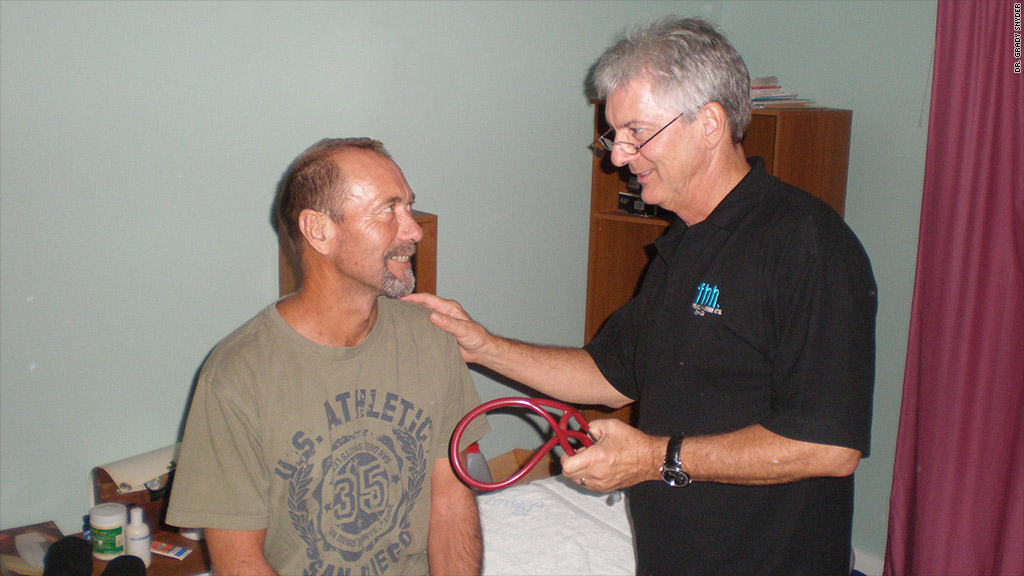
In late 2010, Dr. Grady Snyder saw the writing on the wall. He was burned out, his revenue was shrinking and it was getting too expensive to run his rural practice in Pueblo, Colo.
It was time to quit. On August 19, 2011, Snyder sold his practice to a local hospital 30 miles away.
"I gave up on health care in America," he said. Later that year, he moved to Australia and took up rural medicine there.
The choice was heart-wrenching for Snyder. He didn't want to feel like he was abandoning his nearly 5,000 patients, and he'd been the only family physician in the area for 16 years.
"I wasn't just a doctor there, I was part of this community," he said. "I coached youth basketball here. My kids went to school here."
Snyder's decision to leave was years in the making.
A third of Snyder's rural patients were on Medicare. When Medicare reimbursements to physicians started shrinking in the late 1990s, his revenues fell. At the same time, the cost of running his practice was rising. Snyder tried to control expenses as much as he could.
Then in 2009, a law was passed requiring doctors and hospitals to move to electronic health record systems by 2015. If they didn't, their Medicare payments would be cut further.
That was the final straw. "I couldn't afford that expense. I didn't have $100,000 lying around," he said.
Related Story: Doctors driven to bankruptcy
Snyder wasn't ready to give up being a rural doctor, though. "It's what I loved to do," he said.
Disillusioned with how health care had evolved, and how stressful and expensive it had become to be in private practice in the U.S., Snyder began to explore opportunities to work abroad as a "locum tenens," or freelance doctor.
Locum tenens physicians temporarily cover for physicians at a hospital or private practice when they are sick or on vacation. Because of a shortage of rural physicians, freelance doctors are frequently used to fill the gap.
As he researched opportunities online, a video caught his attention. It was from an Australian nonprofit, Rural Doctors Workforce Agency, which specializes in recruiting freelance primary care doctors from overseas to work in rural parts of southern Australia.
In February, 2011 he interviewed with RDWA. By May he had a contract. He quickly sold his practice, and got his work visa and medical licensing paperwork squared away.
Snyder and his wife, Frances, arrived in Australia on Oct. 6 and settled in Adelaide. Getting certified to practice in Australia as a solo physician took about a year. Until then, he could only work under supervision of a certified doctor.
The work was strenuous and challenging personally and professionally, said Snyder. He traveled a lot and was away from home every other week. He couldn't easily refer patients to specialists, because there weren't many practicing in rural towns around Adelaide. Lack of medical technology was another challenge. "Here you don't have an MRI or CAT scan facility at every corner," he said.
Related story: Doctors going broke
Still, Snyder embraced the experience in a country where he said the locals were welcoming and "loved my accent."
In America, Snyder hardly ever took time off. In Australia, Snyder is contracted to work only 36 weeks a year, plus he gets four weeks' paid vacation time. That's given him time to travel -- he and his wife have visited Sydney, Malaysia and elsewhere in the region.
Even with a much lighter schedule, Snyder is making the equivalent of U.S.$250,000 a year -- $100,000 more than he made practicing in Colorado year round.
Moving overseas has made being a doctor fun again, he said.
"Primary care is highly respected here. That's not the case anymore in America," said Snyder. "In the United States, health care has become more about the business of making money. The personal side of medicine is going away."
In fact, Snyder said he wouldn't be surprised if more primary care doctors in the U.S. look for opportunities elsewhere. His own contract expires at the end of June but he's renewing it for another two years.
Would he consider moving back at some point?
If he could get the benefits he does in Australia back at home, he said, "I'd still be working in America."
-- Continue the discussion: #doctorsquitusa.



